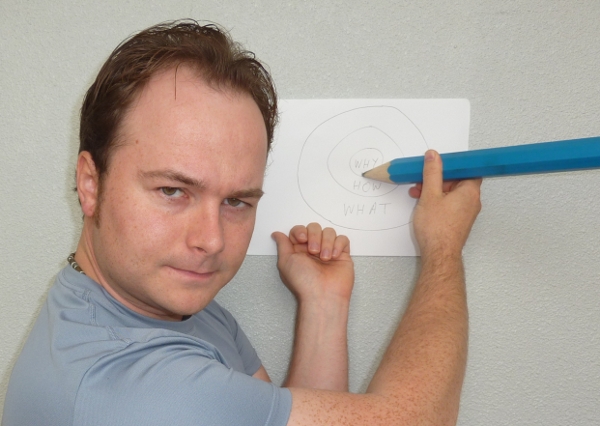Ask WHY first (not how/what): the most important issue ignored in language learning

In years of constantly comparing the many successful vs unsuccessful language learners to see what really makes them different, I can share another huge realisation with you today.
Many of the major questions most people start asking themselves in language learning are, in my opinion, things that should be coming much later in the priority of most important questions.
You may first ask:
Which course material is best? Is Rosetta Stone better than Pimsleur? Should I learn grammar first or later? How do I find the time to learn? Is my language too hard? What if people laugh at me when I make mistakes?
Many of these are important things to consider, but they aren't dealing with what I am finding really separates successful and unsuccessful language learners:
Why are you learning this language?
Before you jump out with a snappy answer, I need to explain this “why” in better context. Those of you who watch TED talks will perhaps have already seen this video some time ago. I stumbled upon it again recently and started thinking how relevant it is to language learning.
The video is actually aimed at businesses (“people don't buy what you do, they buy why you do it”) and trying to inspire leaders, but a lot of the advice and the examples (Wright brothers, Martin Luther King Jr.) are applicable to so many fields. Check it out:
[RSS/email subscribers please click through to the site to see this]
Basically, in modern society people always tend ask the What and How questions first. They feel they are more important than any other question.
And yet those who really make a difference ask why first and then go on to figure out the best what and how to get back to that why, which is always central.
Focus on the why in your language learning and other projects
With languages; “What do I learn?” (material) and “How do I learn it?” (plan of action) are always the first questions people seem to ask. So the big questions tend to be like those I've listed above.
This is flawed focus in my opinion. These practical questions are simply consequential for me and many other successful learners. When people are so focused on these questions then experience tells me that their progress will be slowed down dramatically.
The most successful language learners that I keep coming across, regardless of age, natural talent, riches etc. think about why they are learning the language more than anything. The one thing we all share is passion. You don't need to learn a language exactly like I do or what some other successful learner does to be successful. Almost any method can work if your focus is right.
If the answer to “why” for you is something quantifiable or superficial, like get a better job, be able to chat up Brazilian girls, impress people, pass an exam, etc. then there is no real “why“. All you are interested in is consequences. Actually using the language is irrelevant; these results are what you are truly “passionate” about.
This is one reason a lot of us never learn languages in school. There's no real drive to. Good teachers inspire passion for the language, not explain conjugations better than others.
Why = unquantifiable passion
My reason for learning languages, as I keep mentioning, is communication and cultural discovery. This isn't something that I can really quantify or measure.
It's not something that someone can do better or worse than me (and so, using measurements like “number of words I know” as your basis of comparison is lost on me entirely as incredibly irrelevant). It's more of a gut feeling that I know it's what I want.
Speaking foreign languages enriches my life in the friendships I'll make and experiences I'll have (why I do it), so from here then I will look at the hows and whats that will get me to my goal quickest, and formulate my own particular plan.
I'm very practical in how I do it, but because my end uses are clear, I will learn for those uses instead of some vague general “perfectly master every single aspect of the language” which actually means nothing.
Some people have different passions (writing, reading, enjoying plays etc.) and that's fine; they'll find methods that work for them supported on that passion. This is another reason why there can't be one way to learn a language. I can only suggest what I personally feel works best for speaking-focused passion, and some people need to be honest about if that's what they really want.
Stop focusing so much on your hows and whats and start thinking more about why you are learning the language. That drive will bring you to find your resulting best hows and whats with that end in mind. If there is no strong passion that you always refer back to as the core of what you are doing, then all you are doing is studying a bunch of grammar rules and vocabulary tables.


Social